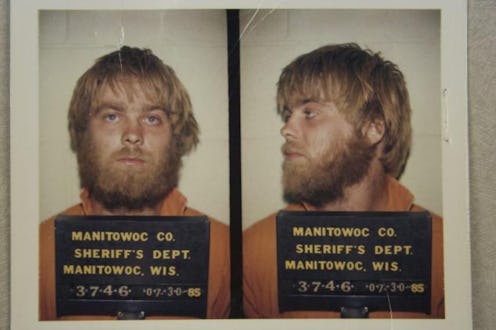Entertainment
The One Documentary Fans of 'MaM' Need To See

Laura Ricciardi and Moira Demos's Making a Murderer has entranced, dumbfounded — and at some points, enraged — its viewers. The 10-episode Netflix original documentary series examines the 2007 conviction of a man named Steven Avery — a man who has a specifically convoluted relationship with the justice system. Lately, the name "Steven Avery" has been on the tips of everyone’s tongues and at the forefront of our sociological and political conversations. Instead of asking your friends and family if they’ve seen the latest Oscar noms, the question is: have you watched Making a Murderer ? And for good reason. Avery's story is fascinating, shapeshifting, and ultimately raises questions about both the legal system and humanity.
But it's not the only docu-series that seeks to unveil the complexities — and at times, unjustness — of that system.
I started viewing Sundance's 2004 docu-series The Staircase with the intent to catch snippets of it for a few minutes, or maybe just one part, but it was too engrossing. Directed by French filmmaker Jean-Xavier de Lestrade, the documentary follows the trial of Michael Peterson, a successful crime novelist who was convicted in 2003 of murdering his second wife after she was found in a pool of blood at their home's staircase. (Since the conviction, Peterson has sought a retrial — and, in 2011, it was granted.) What ensues in the docu-series is an amalgamation of details surrounding her death that, much like in Making a Murderer, make the case both for and against the defendant.
On Dec. 9, 2001, Michael Peterson placed a phone call to 911 after supposedly finding his wife, Kathleen, at the bottom of the staircase, where he claimed she was still breathing but not conscious. In mid-February of that same year, Kathleen's autopsy report was released — along with photographs of the back of Kathleen's scull. The medical examiner believed the wounds to be consistent with that of blunt force trauma, and not that of a fall. Not long after, Michael Peterson was charged with first degree murder of his wife, but maintained that he was innocent. On March 18, 2002, Peterson told TV station WRAL, "I'm not worried about what's going to happen because I know what happened and what did not happen, and I know it'll all work out."
Ultimately, Peterson was convicted in 2003 and sentenced to life in prison without parole. In 2011, he was granted a retrial for the case.
The Staircase serves as an interesting and infuriating complement to that of Making a Murderer for two big reasons: Money and socioeconomic status. Where Steven Avery didn't have a dime to spare, Michael Peterson had many. Peterson was a well-off crime novelist, a Duke graduate, an intelligent, well-spoken man in his late 50s with a family of attractive, intelligent, and well-spoken children. Steven Avery was a poor man, from a poor family, with a below average IQ level and lack of education. But two men from completely opposite sides of the socioeconomic scale who could not be more different end up fighting the same battle for justice.
Of course, Peterson's money afforded him advantages along the way — advantages that were not possible for Steven Avery and his nephew, Brendan Dassey, during their respective trials. Peterson was able to post bail. He never had to worry about his defense team being subpar (something that affected Steven Avery's nephew, Dassey at multiple levels). Peterson's defense team pulled out all the stops — they even traveled all the way to Germany to collect details for a rather small part of the case at one point. In the end, however, none of it mattered for Peterson: Not the money, not the education. The men and their backgrounds were vastly different, but their struggles were eerily similar.
To say that Peterson was without his own marginalizing quirks would be wrong (that's part of what makes The Staircase also inexplicably confounding). Without giving too much away, there are parts of Peterson's life brought out in the trial that let's just say, conservative southerners aren't exactly onboard with in the early 2000s. Peterson is smart and wealthy, but, as with Avery, he's an enigma to most.
What makes The Staircase a particularly interesting counterpart to Making A Murderer is its apparent disinterest in pontification. The docu-series remained impressively neutral — almost removed from the situation — throughout. De Lestrade doesn't seem to be leading the story anywhere, and even though he has since opened up about his thoughts on the case in a piece he wrote for The Daily Beast in 2013, you can easily sense his light-handedness.
Near the end of The Staircase, Peterson's defense lawyer David Rudolf explains "what we've basically built into our system is the notion that we want to have guilt proven beyond a reasonable doubt to avoid innocent people going to prison. It's not perfect, but that's the goal." But if we've learned anything from Making a Murderer, it's that doubt is by no means reasonable.
And if you've any doubts about that, you owe it to yourself to watch The Staircase. Thankfully you can stream it on sundance.tv until March 16.
Images: Netflix